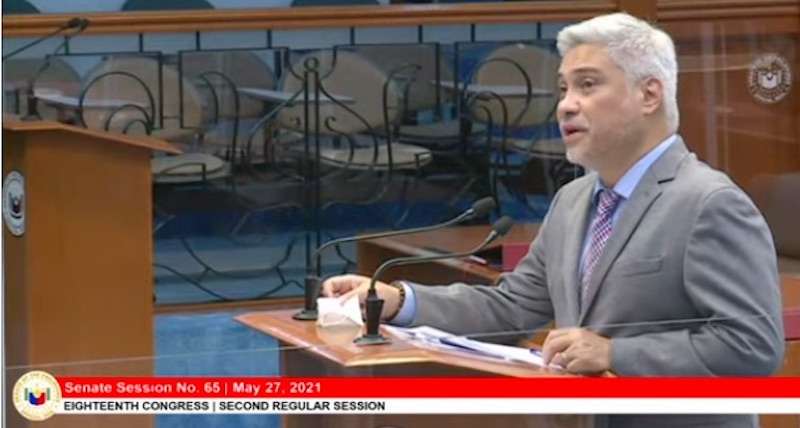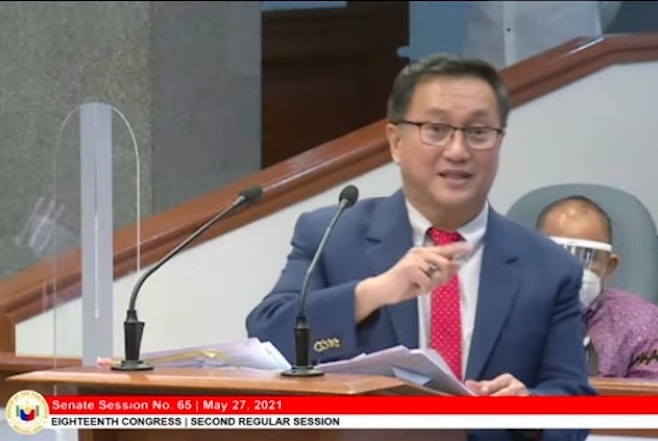DAVAO CITY (MindaNews / 28 May) – Acknowledging what he said was a “firestorm” triggered by two controversial sections in the bill that seeks to extend the transition period in the Bangsamoro until 2025, Senate Majority Leader Juan Miguel Zubiri on Thursday night proposed a “best win-win solution at this point” – to drop the two sections of Senate Bill 2214 and just pass a one-page law.
 Senate Majority Leader Juan Miguel proposes a “win-win solution” on the Bangsamoro transition.
Senate Majority Leader Juan Miguel proposes a “win-win solution” on the Bangsamoro transition.
“Maybe we should just keep it quiet. Maybe we should just say the essence of the Bangsamoro Organic Law shall be maintained and implemented. Can we, at the proper time, just remove Sections 2 and 3 and just leave Section 1 which is a one-page document that says we just move, postpone the elections to 2025?,” Zubiri proposed to Senator Francis Tolentino at the livestreamed plenary session Thursday night.
Tolentino, a lawyer, is chair of the Committee on Local Governments and principal sponsor of Senate Bill 2214, the committee’s substitute bill to SB 2019 filed by Senator Aquilino Pimentel III and SB 2025 filed by Senator Richard Gordon.
The Pimentel and Gordon bills merely amend Section 13 of Article 16 of Republic Act 11054 or the Organic Law for the Bangsamoro Autonomous Region in Muslim Mindanao (BARMM), by resetting the first election of the 80-member Bangsamoro Parliament to 2025 instead of 2022.
Section 1 of SB 2214 retained the change from 2022 to 2025.
Its Section 2, however, states how the 80 seats of the Bangsamoro Transition Authority (BTA), the body tasked to govern the BARMM during the transition period, should be allocated by the President who will appoint its members.
The current BTA is based on the Comprehensive Agreement on the Bangsamoro (CAB), the peace agreement signed by government and the Moro Islamic Liberation Front (MILF) in March 2014, and its enabling law, RA 11054. The BTA is MILF-led and out of 80 members, 41 were nominated by the MILF and 39 by the government.
Tolentino has repeatedly stressed that the aim of the bill is to extend the mandate of the BTA until 2025, as an institution, not to extend the term of its members.
Under the Bangsamoro law, the BTA is supposed to end noon of June 30, 2022, when the first set of elected officials of the BARMM shall have taken their oath.
“New” BTA members
SB 2214 proposes the appointment by the President of 80 “new interim members” of the BTA and spells out the seat allocations: 47 members nominated by the MILF from whom the Chief Minister will be appointed; 24 members or four members nominated by “each of the six BARMM provincial local government units through their respective Sanggunians,” naming the provinces as “Basilan, Lanao del Sur, Maguindanao, Sultan Kudarat, Tawi-tawi, and Sulu;” one member each nominated by “BARMM barangays in North Cotabato, Marawi City, and Cotabato City;” and six members nominated by non-Moro Indigenous Peoples, ”such as Teduray, Lambangian, Dulangan Manobo, B’laan, and Higaonon.”
Lamitan City, one of three cities in the BARMM, has no seat allocation but Sultan Kudarat province, according to Section 2, is to be given four seats even as it is not part of the Bangsamoro region. The province is part of Region 12, also known as Soccsksargen.
RA 11054 or the Organic Law for the BARMM, provides for an 80-member, MILF-led BTA appointed by the President. The law provides that “non-Moro indigenous communities, youth, women, settler communities, traditional leaders, and other sectors” shall have representatives in the BTA.
SB 2214’s Section 3 provides that “notwithstanding Section 3, Article VI of R.A. No. 11054, a Joint Congressional Oversight Committee is hereby created to aid the BTA in the performance of Its functions and priorities.”
Sec. 3 of Article VI of the Bangsamoro law provides for the creation of a “Philippine Congress – Bangsamoro Parliament Forum for purposes of cooperation and coordination of legislative initiatives.”
“The essence of the Bangsamoro Organic Law,” said Zubiri, should be “maintained and implemented.”
“We cannot veer away from the Bangsamoro Organic Law,” Zubiri said, adding dropping Sections 2 and 3 would “make our lives so much easier.”
“Simplify the measure,” he said as he shared to his colleagues that he received so many calls and text messages complaining or lobbying for appointments for seats in the BTA.
“Fake news”
He also debunked as “fake news” reports that the Senate bill was removing representation of settler communities who are Christians, allegedly paving the way for “absolute Muslim authority (and) leaving the Christians without a voice.”
“This is fake news,” he said.
 Senator Francis Tolentino, chair of the Senate Committee on Local Governments and principal author of SB 2214.
Senator Francis Tolentino, chair of the Senate Committee on Local Governments and principal author of SB 2214.
Tolentino said it is “definitely fake news” because he repeatedly mentioned settler communities “more than five times” during the plenary session the day before and that if they were not named in Section 2, it “does not, would not, should not be equated to a repeal.”
He acknowledged he was in a “very distressful situation” although added this is part of his job as committee chair rendering the committee report to the plenary.
Zubiri said he received a call from Cardinal Orlando Quevedo, Archbishop Emeritus of the Archdiocese of Cotabato, who he said, was “very worried” but he told him “we will not pass a measure that will not include the true essence of what we had passed in the (Bangsamoro) organic law.”
“Unburden us”
Simplifying the measure by pushing only Section 1, Zubiri said, would “unburden us because if we do not do that, all of us will get calls. And you know many of us are reelectionists. Many of us are getting calls now from the governors, from the congressmen, from the mayors, from the different groups, Christians, Ulama, from the NGOs, to make sure that instead of two, they are given three seats. Different groups want, instead of six they be given eight seats. Napakahirap (It’s so difficult.”
“We cannot veer away from (what the) BOL stipulates on how many should be given, who should be given during the transition period.”
“To make our lives so much easier… we just simplify the measure,” Zubiri said. He warned that if the measure is not passed before the sine die adjournment next week, lobbyists will visit the senators in their respective areas.
“They will just really lobby continuously,” Zubiri said.
He explained that the simplified version of just changing the year of election will “stand the scrutiny of Constitutionality if somebody challenges this.”
He pointed to the challenges they need to overcome if Section 2 is retained. He noted that Senator Panfilo Lacson already said Section 3 in the bill is not in the Bangsamoro law.
If the proposed law will just push for Section 1 – change 2022 with 2025 — “I believe we may even pass this next week without any problems.”
He described it as “the best win-win solution at this point in time.”
“Firestorm”
He admitted that he had earlier agreed with Tolentino on the seat distribution but “we did not realize the firestorm that had come out of it because of intense lobbying from different individuals and we apologize to those who felt slighted or felt they lost their voice. It was not the intent of the sponsor nor this chamber.”
If Tolentino agrees, Zubiri said, “as early as today, wala na tayong problema” (we won’t have a problem” and they can just tell those who are calling them “mag- lobby na lang po kayo sa Malacanang (just lobby with Malacanang) because the appointing authority is the President.”
Tolentino agreed with Zubiri’s proposal. “Simplicity is a virtue. I do recognize the …. ramifications of what was intended in Section 2. I will follow the lead of the Majority Leader.”
Zubiri said he wanted to put on record that Tolentino “tried to find the most equitable solution.”
Senate President Tito Sotto asked Tolentino what his response was to Zubiri’s manifestation.
Tolentino replied that he has to “simplify my answers in the forthcoming interpellation,” that simplicity is a virtue and that Section 2 is “not etched in stone.”
He said the signing the night before of the law dividing Maguindanao into Maguindanao del Norte and Maguindanao del Sur, is “a signal that what is written here can change.”
The two Maguindanaos are part of the BARMM.
He said he agrees with Zubiri on simplifying the measure. “We can delete, we can dilute some items just to achieve same process and results: peace for Bangsamoro.”
“Not as simple as that”
But Senate Minority Leader Franklin Drilon said the proposal to simplify the measure is “not as simple as that.”
“The policy issue you have to decide on is when you postpone (the 2022 election to 2025), what will happen to the incumbents whose terms will expire? Will they be on holdover capacity? Would they need a new appointment,” he asked.
Drilon said this will have to be answered in the plenary.
Tolentino explained that the main policy consideration is to postpone the election but not to extend terms of the officials. “We are extending the term of the institution the structure, that is the BTA,” he said.
He said they “recognize and reiterate and acknowledge the prerogative” of the President, the appointing power.
Tolentino added that holdover provisions are “frowned upon by the Supreme Court.”
Drilon said RA 11054 provides that the term of office of the BTA members expires on June 30, 2022. “That’s why we have to determine. I am not saying we should not allow a holdover,” Drilon said, adding it should be decided expressly whether they will be on holdover capacity or leave it to the appointing authority.
“We will debate on that at the appropriate time,” he said.
Race against time
Deliberations on the bill will continue on Monday but will the the measure be passed before Congress adjourns sine die on Thursday?
President Rodrigo Duterte has not certified the bill as urgent.
In the House of Representatives, five bills on the proposed extension of the Bangsamoro transition are still pending before the Joint Committees on Suffrage and Electoral Reforms, Muslim Affairs, and Peace, Reconciliation and Unity.
In the Senate Committee’s last hearing on the bill on May 14, Rex Laudiangco, Director of the Commission on Election’s law department, reiterated what Comelec chair Sheriff Abas said in a meeting in Davao City that “our only position is to request that any legislative action be made not later than July because we are nearing the crux of preparations for the 2022 elections” and the filing of COCs would require “configuration of software and hardware.”
When Congress adjourns sine die on Thursday, it will resume sessions on July 26 when President Rodrigo Duterte delivers his sixth and last State of the Nation Address, The last session days of July are on the 27th and 28th (Carolyn O. Arguillas / MindaNews)
